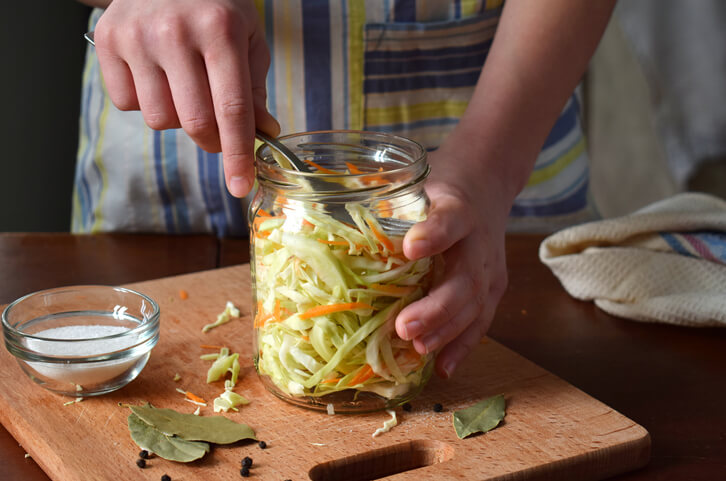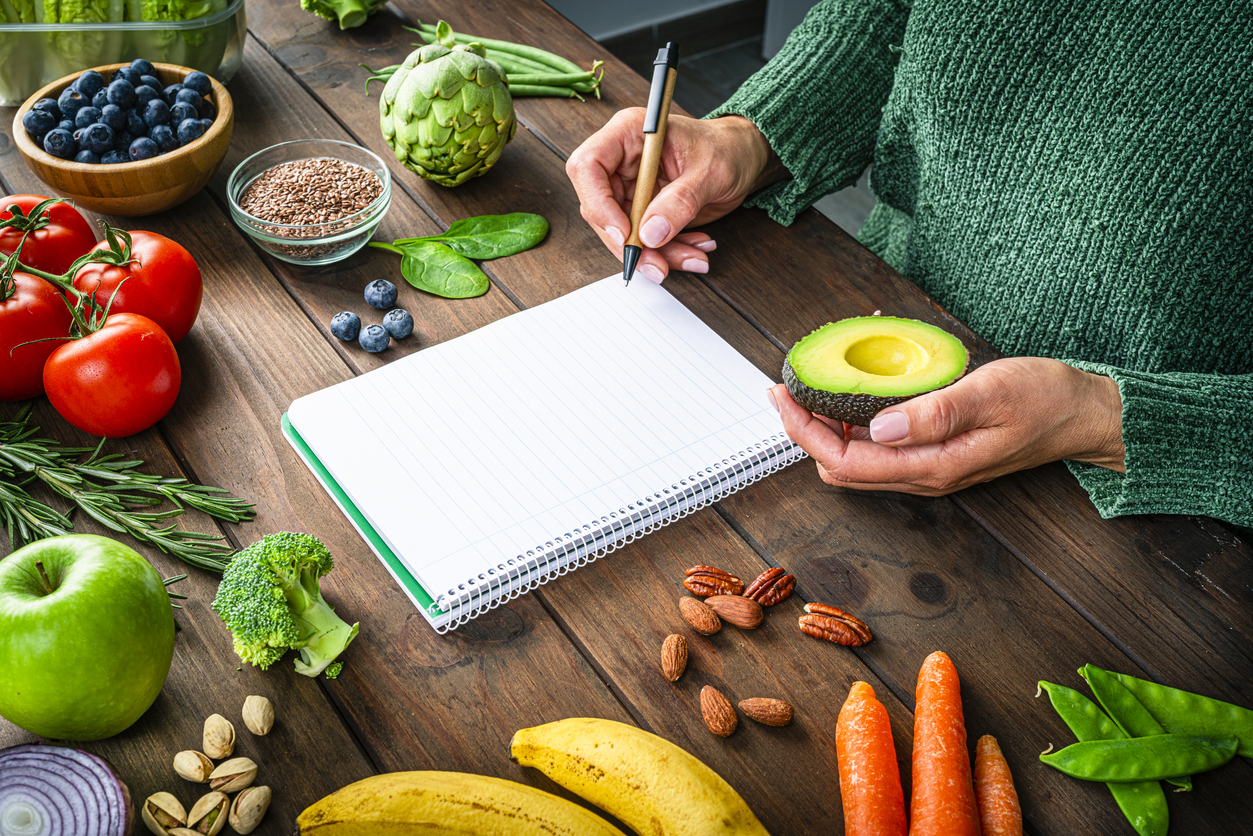
COVID-19 Prep: How to Stock up Your Paleo-Friendly Pantry and Freezer

Page Contents:
The good news is that there are plenty of Paleo-friendly food options out there with long shelf lives. In this article, I’ll go over some basics of how to prep your pantry and freezer for COVID-19, as well as offer you some tips and recipes to help you stay nourished, body and mind, during these challenging times.
Looking for Paleo-friendly recommendations to help you stock up during social distancing? This is your primer on nutritious shelf-stable and frozen food options that are still Paleo. #paleo #coronavirus #covid19
For More Information on COVID-19 and Flattening the Curve:
Why It’s Important to Keep Eating a Nutrient-Dense Diet
Maintaining a healthy, nutrient-dense diet is crucial for your immune system. Your immune system needs proper nutrition to function, and your gut health also depends on your diet. Your gut and immune system are so closely linked that research shows a healthy gut microbiota promotes the development of a robust immune system, and gut dysbiosis may hamper your immune response. (1)
A nutrient-dense, ancestral diet ensures that your immune system gets what it needs to thrive. It’s also free from the potentially harmful foods found in the standard American diet, like:
It’s also important to focus on other core pillars of immune health, like stress management, getting enough sleep, and ensuring that you’re getting regular exercise.
How to Prep for COVID-19
While there is still a lot of uncertainty surrounding the spread of COVID-19, I think it’s clear that we’re in for a marathon, not a sprint. It’s worth it to continue preparing yourself and your family for what may be a long period of social isolation and disruption to your normal schedule.
Your best bets for COVID-19 prep include shelf-stable and frozen foods. When it comes to finding these products, you have a couple of options if your local supermarket is sold out:
-
- Purchasing directly from the manufacturer where possible
- Purchasing through Amazon (and checking back regularly if something is sold out)
- Using a delivery service like Thrive Market, which stocks foods that work with Paleo, keto, grain-free, and other diet variations (and if you’d like a discount off of your first order when you sign up for Thrive Market, click here)
As an important note while you prep for COVID-19, don’t overbuy. We’re all in this experience together, and purchasing bulk quantities may mean that someone else has to go without. Stock up slowly so others also have a chance to buy what they need to care for their families.
Build a Shelf-Stable Paleo Pantry
The foods below are good to have on hand at any time, and some of them carry health benefits that are especially important now. Stock up on foods that are nutrient-dense, shelf-stable, and good for your immune system.
Healthy Fats for Cooking and Sauces
Healthy fats are calorie-dense foods that are quite nourishing and essential for creating well-cooked meals to share with your family. I recommend stocking up on:
- Coconut oil
- Ghee
- Olive oil
- Avocado oil
My family and I also use lard and duck fat in our cooking, so we keep that on hand, as well. Be sure to check the smoke point of your fat before cooking with it, especially if it’s a product you don’t normally use.
Coconut milk is another healthy fat that makes a great addition to sauces and smoothies.
Bone Broth
Bone broth has incredible benefits when it comes to strengthening your immune system and supporting your gut health. Broths and stocks are also highly versatile kitchen staples that can enhance the flavor profile and nutrition of your meals.
You can make bone broth at home if you have the ingredients, but if you don’t, Kettle & Fire offers a shelf-stable option in carton packaging. Kettle & Fire is the best, healthiest packaged option I’ve found. I believe in their product so much that I’m an investor in the company. If you’d like to give them a try and would like a discount, click here.
Canned Fish and Meat
Canned meats are a shelf-stable option when you can’t find fresh or frozen. For high-quality seafood products, I often order from Vital Choice. For canned meats, look for products that are free from sauces, preservatives, or any other added ingredients. Wild-caught seafood and pasture-raised meats are your most nutritious options.
Nuts, Seeds, and Nut Butters
Nuts and seeds make an easy snack and nut butters are a shelf-stable, nutrient-dense food. When purchasing nuts and seeds, look for either raw options or products that have been soaked and sprouted (this process removes the anti-nutrients found in nuts). Check the ingredients on nut butters to ensure you steer clear of industrial seed oils or any other overly refined products—or you can make your own using the Almond Butter recipe provided at the end of this article.
Grains, Legumes, and Baking Supplies
If you tolerate them, grains and legumes are another versatile shelf-stable food. Look for:
- Quinoa
- Amaranth
- Millet
- Rice
- Lentils
- Sprouted oats (or you can soak oats yourself for 12 to 18 hours to make them more digestible and increase nutrient bioavailability)
Baking supplies like almond flour, cassava flour, and plantain flour are also great to have on hand for the occasional treat.
Non-Dairy Milk
While traditional milk may be hard to come by and will spoil quickly, non-dairy milks in carton packages may last longer and may even be shelf-stable.
If you’re unsure whether or not a product is shelf-stable, always check the packaging. Some shelf-stable, cartoned products are stored in the cold section of the supermarket even when they don’t need to be, while other cartoned products do need to stay refrigerated.
Spices and Aromatics
Herbs and spices are nutrient-dense additions to your kitchen. (4) Check your cabinet to be sure you have the essentials, like salt and pepper, as well as any other flavors you enjoy. Certain spices and aromatics also carry immune-boosting and anti-inflammatory properties, like:
- Turmeric, which is rich in curcumin. Curcumin is anti-inflammatory and helps to regulate the immune system (along with providing a host of other health benefits). (5)
- Garlic, which has antimicrobial effects and can improve immune function. (6)
- Ginger, which may have antiviral properties and is a key ingredient in fresh ginger tea. (7)
Coffee, Tea, and Snacks
These may not seem like must-haves, but it’s important to keep living your life and to enjoy foods that bring you joy and pleasure. Making time for happiness can help you manage your stress levels and build your overall resilience, which are crucial steps for maintaining health.
What’s more, coffee carries potential health benefits, as does polyphenol-rich tea, while dark chocolate is a low-sugar and nutrient-dense snack option. Other Paleo-friendly snacks include:
- Jerky or meat sticks
- Cured meats like salami
- Dried fruits
- Olives
Homemade nut bars are another great snack option. Check out the recipe provided by Katie Melville in her article about Paleo staples—she also provides great information on making other Paleo staples, like mayonnaise, sauerkraut, yogurt, and salad dressings.
Stock Your Freezer with Nutrient-Dense Options
Frozen foods are a great option when it comes to stocking up on perishables. Ensure you have the space to safely store everything before you buy.
Frozen Vegetables and Fruit
Frozen fruits and vegetables are more nutrient-dense than canned varieties, so I typically buy frozen if I can. Frozen options are often flash frozen right after they’re harvested, so there’s less time for nutrients to degrade.
Frozen Meat and Fish
If you can’t find canned seafood or meat, frozen meat and seafood are another great option. Again, check for wild-caught seafood and pasture-raised meat, and be sure to store them in an airtight container to prevent freezer burn.
Non-Frozen Goods that Can Be Stored in the Freezer
Some foods freeze well even if that’s not how they’re traditionally stored. Butter will last for quite a long time in the freezer, as will many homemade baked goods (if you tolerate them).
You can also freeze fresh vegetables yourself, but you’ll likely need to prepare them first. Some fruits can be frozen with little prep needed, while vegetables will probably need to be blanched before freezing. The National Center for Home Food Preservation provides in-depth information on the steps you’ll need to take to do this properly. For vegetables, check out their blanching guide, and for specific information on how to freeze different foods, click here.
If your supermarket is sold out of pre-frozen products, buying fresh and freezing them yourself may be a good option.
Choose Long-Lasting Perishable Options
While these foods are perishable, they can last for weeks in some cases. Stock up on:
- Citrus fruits and peppers, which are great sources of vitamin C.
- Fermented foods like sauerkraut, pickles, and kimchi, and if you tolerate dairy, yogurt, kefir, and cheese—all of which are beneficial for your gut health.
- Eggs, which are nutrient-dense and can be hard-boiled for an easy snack.
- Starchy vegetables like potatoes, sweet potatoes, and winter squash. These tend to store well and their low soluble fiber content makes them easy on the gut.
- Onions, which store very well and are incredibly versatile additions to your kitchen.
- Other fruits that store well, like apples, pears, and melons.
Check the Nutrition Label When You Buy Packaged Foods
Harmful food additives are common in packaged goods—even those that are marketed as “healthy.” If you’re used to only buying whole, fresh options, be on the lookout for things like industrial seed oils and added sugars, as well as soy and grains (if you don’t tolerate them). Check out this article for details on deciphering labels.
Why This Is a Great Time to Try Meal Prep
It’s natural to feel overwhelmed during times of uncertainty, but it’s also possible to find ways to manage stress levels and experience joy no matter what else is going on around you.
If you haven’t tried it before, now is a good time to give meal prep a try. It’s a surefire way to simplify meals and ensure that you and your family have a steady supply of healthy food that’s ready to go. The meal prep process itself can be turned into an enjoyable routine that your whole family can take part in.
For in-depth tips on getting started with meal prep, check out my article “Meal Prep: Your Best Tool for Healthy Eating.”
27 Simple Recipes You Can Make at Home
I’ve collected a handful of my favorite recipes here for easy reference. These are simple to pull off, delicious, and healthy Paleo options that can be adapted to work with what you have on hand. Replace fresh ingredients with dried, frozen, or canned if you need to—don’t be afraid to make the changes you need to fit what’s in your kitchen.





